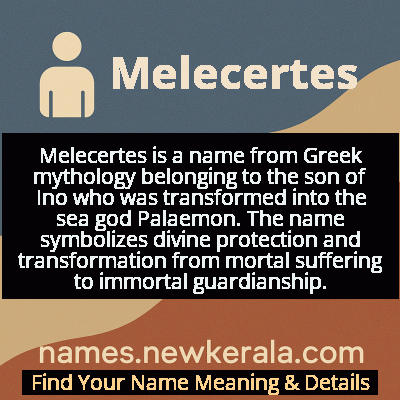Melecertes Name Meaning & Details
Origin, Popularity, Numerology Analysis & Name Meaning of Melecertes
Discover the origin, meaning, and cultural significance of the name MELECERTES. Delve into its historical roots and explore the lasting impact it has had on communities and traditions.
Name
Melecertes
Gender
Male
Origin
Greek
Lucky Number
6
Meaning of the Name - Melecertes
Melecertes is a name from Greek mythology belonging to the son of Ino who was transformed into the sea god Palaemon. The name symbolizes divine protection and transformation from mortal suffering to immortal guardianship.
Melecertes - Complete Numerology Analysis
Your Numerology Number
Based on Pythagorean Numerology System
Ruling Planet
Venus
Positive Nature
Harmonious, responsible, caring, and artistic.
Negative Traits
Overly idealistic, superficial, possessive, or jealous.
Lucky Colours
Pink, turquoise.
Lucky Days
Friday.
Lucky Stones
Diamond, turquoise.
Harmony Numbers
2, 3, 9.
Best Suited Professions
Artists, musicians, teachers, healthcare workers.
What People Like About You
Warmth, nurturing nature, artistic flair.
Famous People Named Melecertes
Melecertes
Mythological Figure
Transformed into the sea god Palaemon after his tragic death, becoming a protector of sailors
Melecertes of Corinth
Religious Figure
Central figure in the Isthmian Games cult, worshipped as a guardian deity of the Isthmus of Corinth
Melecertes the Navigator
Explorer
Legendary explorer who established trade routes across the Aegean Sea, inspired by his mythological namesake
Name Variations & International Equivalents
Click on blue names to explore their detailed meanings. Gray names with will be available soon.
Cultural & Historical Significance
The cult significance of Melecertes, particularly in his form as Palaemon, demonstrates how mythological figures were integrated into daily religious practice. At the Isthmian Sanctuary near Corinth, one of the four Panhellenic game sites, Melecertes/Palaemon was worshipped alongside Poseidon, indicating his importance in maritime culture. Sailors and athletes alike sought his protection, seeing in his story the promise that even the most tragic circumstances could lead to protective power. This dual aspect - the vulnerable child and the powerful deity - made him an accessible figure for personal devotion while maintaining his status in official state cults.
Extended Personality Analysis
Those bearing the name Melecertes often exhibit a personality marked by profound emotional depth and resilient transformation. Drawing from the mythological narrative of tragic beginnings leading to divine purpose, these individuals typically demonstrate an extraordinary capacity to overcome adversity and channel their experiences into protective or nurturing roles for others. There's a natural inclination toward guardianship and guidance, reminiscent of Palaemon's role as protector of sailors, combined with the emotional sensitivity of someone who understands suffering intimately.
The Melecertes personality often balances contemplative depth with practical action. They tend to be introspective individuals who have learned to navigate complex emotional landscapes, yet this introspection fuels their ability to act decisively when others need protection or guidance. There's frequently a spiritual or philosophical dimension to their character, as they naturally ponder the larger patterns of suffering, transformation, and purpose. While they may carry the weight of their namesake's tragic origins, this typically manifests as empathy rather than melancholy, creating individuals who are both strong shelters in storms and thoughtful companions in calm waters.
Modern Usage & Popularity
In contemporary naming practices, Melecertes remains an extraordinarily rare choice, primarily confined to academic circles, mythology enthusiasts, and families with strong connections to Greek heritage or classical studies. The name has never gained mainstream popularity due to its complexity, specific mythological associations, and the tragic elements of its origin story. However, it occasionally appears in modern Greek communities where mythological names maintain cultural relevance, and among scholars who appreciate its rich narrative background. Recent years have seen a minor resurgence of interest in obscure mythological names, placing Melecertes in the category of 'scholarly exotic' names - those chosen by parents seeking distinctive names with deep cultural roots that haven't been diluted by overuse. Its usage patterns show it's more likely to be a middle name than a first name, and it occasionally appears in literary works or artistic projects exploring Greek mythology through modern lenses.
Symbolic & Spiritual Meanings
The name Melecertes carries profound symbolic weight representing the alchemy of suffering into protection and the transformation of vulnerability into strength. It symbolizes the journey from being a victim of circumstances to becoming a guardian against those same dangers for others - a powerful metaphor for post-traumatic growth and the development of empathy through personal experience. The sea transformation aspect symbolizes emotional depth, adaptability, and the ability to navigate life's uncertainties while maintaining purpose and direction.
Metaphorically, Melecertes represents the idea that our greatest trials can become the source of our most meaningful contributions to others. The child who becomes a deity embodies the potential for innocence to be preserved not through avoidance of suffering, but through transformation of that suffering into protective power. This makes the name a symbol of hope - that no experience is wasted, and that personal tragedy can be the crucible in which compassionate strength is forged. The dual identity as both Melecertes and Palaemon also symbolizes the integration of different aspects of self, and how our identities can evolve while retaining core elements of our essential nature.

